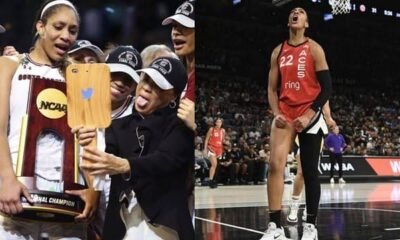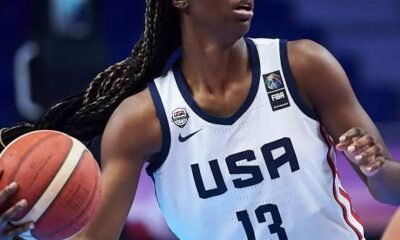Blog
Breaking: South Carolina and USC Secure Exciting Two-Year Women’s Sports Deal…
Breaking News: South Carolina and USC Secure Exciting Two-Year Women’s Sports Deal—You Won’t Believe What’s Next!
In a groundbreaking move set to reshape the landscape of women’s college sports, the University of South Carolina and the University of Southern California (USC) have announced an unprecedented partnership focused on promoting and expanding women’s athletics over the next two years. This alliance signals a bold step toward greater investment, visibility, and opportunities for female athletes across both programs.
**A Historic Partnership Rooted in Growth and Equality**
This collaboration is the first of its kind, uniting two powerhouse programs from different regions—South Carolina, a leading program in the Southeastern Conference (SEC), and USC, a prominent member of the Pac-12. The two universities, both renowned for their athletic excellence and commitment to gender equity, are leveraging their combined resources to create a model for future inter-conference collaborations.
The partnership aims to increase funding, improve infrastructure, and enhance marketing efforts for women’s sports, including basketball, soccer, volleyball, softball, and more. Officials from both universities emphasized that this deal reflects their shared dedication to fostering a culture of equality and empowering female athletes to reach new heights.
**Key Components of the Agreement**
1. **Joint Investment in Facilities and Resources:** Both schools are committing millions of dollars toward upgrading athletic facilities dedicated to women’s sports. This includes state-of-the-art training centers, locker rooms, and medical support to ensure athletes have the best environment to excel.
2. **Shared Marketing and Media Opportunities:** Recognizing the importance of visibility, the partnership will co-promote women’s games and events across digital platforms, creating a broader audience and increased media coverage. This strategic move aims to elevate the profile of women’s sports and attract sponsorships.
3. **Academic and Athletic Development Programs:** The alliance will develop joint clinics, camps, and leadership programs designed to cultivate talent and leadership among female student-athletes. It also includes mentorship initiatives connecting current athletes with alumni and industry professionals.
4. **Research and Data Sharing:** Both universities will collaborate on research related to women’s sports, including health, nutrition, psychology, and performance analytics. These insights will inform training regimens and athlete support services.
5. **Community Engagement and Outreach:** The partnership emphasizes community involvement, with plans for outreach programs that encourage young girls in local communities to participate in sports and pursue their athletic dreams.
**What This Means for Student-Athletes**
For current and prospective student-athletes, this agreement promises enhanced support systems, increased scholarship opportunities, and exposure that can translate into professional athletic careers. The collaboration also signals a commitment to creating a more inclusive environment where female athletes are celebrated and given the resources they need to succeed.
**Implications for College Sports and Beyond**
This two-year deal could serve as a blueprint for future collaborations across conferences and universities, especially as the NCAA continues to emphasize gender equity in sports. It aligns with broader societal movements advocating for equal pay, representation, and recognition for women in athletics.
Moreover, the partnership arrives at a critical time, as women’s sports have gained significant attention following landmark events like the NCAA Women’s Basketball Tournament’s record viewership and the success of professional leagues such as the WNBA and NWSL.
**Expert Perspectives**
Sports analysts have lauded the partnership as a visionary step forward. Dr. Emily Carter, a professor of sports management at a leading university, remarked, “This alliance between South Carolina and USC exemplifies how institutions can collaborate to accelerate growth in women’s sports. It not only benefits the athletes but also sets a precedent for equitable investment across the collegiate sports landscape.”
Former athletes and advocates have also expressed optimism. Jessica Martinez, a former college volleyball star, said, “Seeing these universities prioritize women’s sports sends a powerful message to young girls everywhere—that their dreams are valid, and they deserve the same support as male athletes.”
**Challenges and Opportunities Ahead**
While the partnership is promising, it also presents challenges. Coordinating resources across different conferences, managing logistics, and ensuring equitable distribution of benefits require careful planning and transparency. There will also be ongoing negotiations around branding rights, scheduling, and fan engagement.
However, the opportunities far outweigh the obstacles. Increased media exposure and investment can lead to higher attendance at games, more sponsorship deals, and greater national recognition. Over the next two years, fans and athletes alike will watch eagerly to see how this innovative partnership unfolds.
**Looking Forward: The Future of Women’s College Sports**
This agreement between South Carolina and USC is more than just a two-year commitment; it’s a symbol of evolving attitudes toward women’s athletics. As more universities recognize the importance of supporting female athletes, the landscape is poised for transformative change.
In the long term, such collaborations could lead to:
– Enhanced scholarship opportunities
– Better athlete health and safety protocols
– More competitive and entertaining sports programs
– Increased diversity and inclusion initiatives
– Greater media coverage and commercial interest
**Conclusion**
The partnership between the University of South Carolina and USC marks an exciting chapter in college sports history. By pooling their resources and vision, these institutions are charting a course toward a more equitable and vibrant future for women’s athletics. Fans, athletes, and advocates worldwide will be watching with anticipation as the next two years unfold, hopeful that this collaboration sparks a broader movement toward gender equality in sports.
-

 Arsenal1 year ago
Arsenal1 year agoSad News Arsenal ex player who is goal scorer confirmed dead this morning
-

 Liverpool1 year ago
Liverpool1 year agoSad News Sadio Manè Confirmed Dead Today By Sky Sports Reporters, Open For Full Story 👇
-

 Blog10 months ago
Blog10 months ago“I was forcefully removed from Manchester United squad and now I’ve joined the best team in the world…I will revenge and as a result, I’ve ordered my friend who’s their best player currently to leave there with immediate effect and he has agreed”: Former Man United player angered by United decision to removed him from the squad as he ordered the Club’s best player to leave immediately.
-

 Blog8 months ago
Blog8 months agoSad News: Manchester United player died when playing for his country England yesterday 😢 😔
-

 Blog1 year ago
Blog1 year agoR.I.P: Formal Real Madrid and France international confirm death this morning
-

 Chelsea1 year ago
Chelsea1 year agoBreaking New:”Roman Abramovich could get Chelsea back”? Chelsea owner review the conversation between him and Roman Abramovich in. Deal about getting Chelsea back
-

 Blog1 year ago
Blog1 year agoUNBELIEVABLE: Manchester City midfielder KELVIN DE BRUYNE divorced wife this morning after DNA test revealed their 5 years old son belongs to formal Manchester United player
-

 Manchester United10 months ago
Manchester United10 months agoOFFICIAL NOW: Manchester United announce the signing of 23yr sensational player after beating Liverpool and Madrid for His signature, agreement reached on a 5yr deal, Medical completed – announcement ongoing












